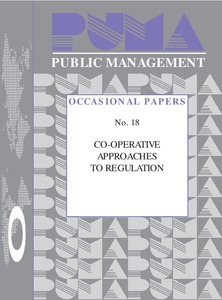Co-operative approaches to regulation
"In many countries a new concept is emerging as an alternative to command-and-control regulation: the concept of shared responsibility between governments and businesses. Governments and businesses are seeing a need for co-operation and partnership, rather than confrontation and adversarial rel...
| Institution: | ETUI-European Trade Union Institute |
|---|---|
| Format: | TEXT |
| Language: | English |
| Published: |
Paris
1997
OCDE |
| Subjects: | |
| Online Access: | https://www.labourline.org/KENTIKA-19203669124910218419-Co-operative-approaches-to-reg.htm |
| Summary: | "In many countries a new concept is emerging as an alternative to command-and-control regulation: the concept of shared responsibility between governments and businesses. Governments and businesses are seeing a need for co-operation and partnership, rather than confrontation and adversarial relations. Increasingly, governments and businesses, often represented by business federations, are engaged in dialogue to find more effective and efficient solutions to conflicts between public and private interests, solutions in which multiple public and private bodies set goals, identify solutions, and monitor outcomes. This Occasional Paper contains case studies on different strategies of public/private co-operation from Canada, the Netherlands, the United Kingdom and the United States.
Table of Contents
Executive Summary
Introduction by Hans Huigen
Chapter 1. Responsible Care Initiative: Canadian Chemical Producers’ Association: A case study from Canada
Chapter 2. The Advertising Standards Authority and the System of Self-Regulation in the United Kingdom, by Caroline Crawford
Chapter 3. The Covenant as an Instrument of Environmental Policy: A Case Study from The Netherlands, by Kees Bastmeijer
Chapter 4. Flexibility Through Public Private Partnerships: Prevention and Harmonization in FDA’s Seafood HACCP Regulatory Alternative, by Daniel J. Chenok" |
|---|---|
| Physical Description: | 51 p. Digital |

